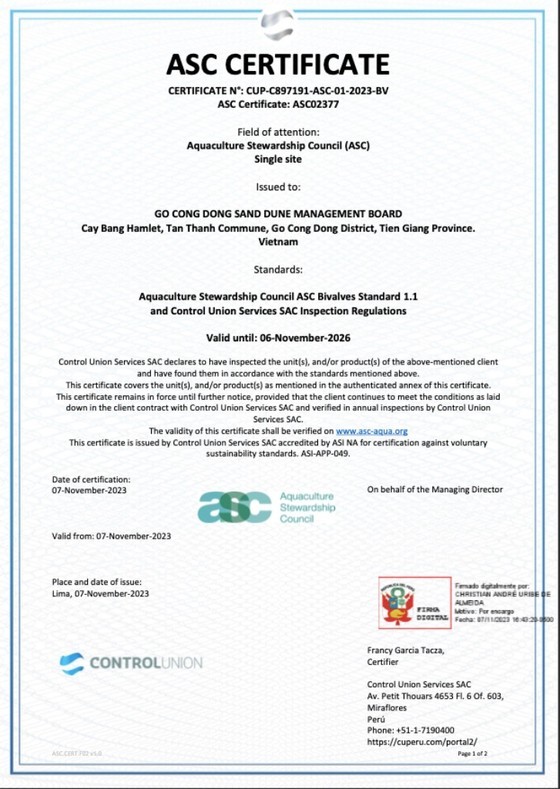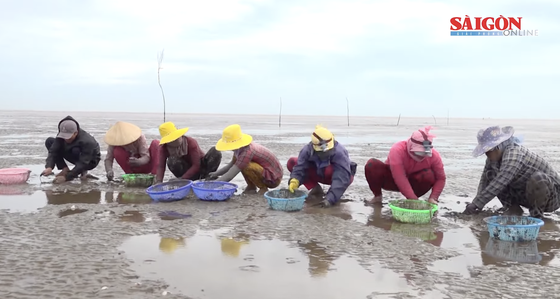 |
ASC certificate |
Moreover, at the awarding ceremony to receive the International Cooperation Center for Sustainable Aquaculture and Fisheries (ICAFIS)’s ASC certification, a signing ceremony of the Tien Giang clam value chain took place.
The event saw the participation of leaders of provincial agencies, leaders of the People's Committee in Go Cong Dong District, representatives from OXFAM, ICAFIS, RECERD consulting unit, the Control Union certification organization, Tien Giang province clam farming community and clam processing businesses and exporters in the Mekong Delta.
At the ceremony, Deputy Director of the Department of Agriculture and Rural Development of Tien Giang Province Tran Thi Be Bay said that ASC is a certification for sustainable and responsible aquaculture. This most credible, robust certification for farmed seafood has been trusted by a large number of international markets.
 |
People harvest clam in Go Cong Dong District |
The clam farming area in Go Cong Dong District is certified to meet ASC standards, which will pave the way for the promotion of brands and clam products to domestic and foreign consumers; thereby, creating more favorable conditions for exporting local special seafood.
According to Mr. Dinh Xuan Lap, Deputy Director of the International Cooperation Center for Sustainable Aquaculture and Fisheries (ICAFIS), clams are one of the four main aquatic products of Vietnam along with shrimp, pangasius, and tilapia. These creatures are favorite seafood in many markets around the world such as Europe, America, Japan, Malaysia, and Australia.
When clam farming was developed, especially in the coastal tidal flat area and created jobs for about 200,000 workers. Tien Giang is one of the provinces with a developed clam industry in Vietnam. Farmers started deep-water clam farming in Go Cong Dong District before 1975. By 1990, the People's Committee of Tien Giang Province divided plots and assigned contracts to households to raise clams while the Go Cong Dong district dunes management board was assigned to protect and develop the clam farming.
Climate-related changes, such as warmer temperatures and a change in the chemistry of the ocean in Go Cong Dong, have threatened shellfish. Moreover, clam farming in Go Cong Dong is affected by epidemics, unstable prices, and unstable income, especially in the context of the global economic recession with increased requirements of the import market.
Currently, clam farming in the coastal area of Go Cong is developing quite well. According to survey results in 2022, 530 households in the province have been allowed to lease land for raising clams; therefore, it helps solve many socio-economic problems in the locality as well as offer jobs for thousands of local inhabitants.
The entire Go Cong Dong district currently has about 2,200 hectares of mollusk farming area, mainly clams, with an annual output of about 18,000 - 20,000 tons of commercial clams.
According to ICAFIS, the Go Cong Dong district clam farming area is the fourth clam farming area in Vietnam and also the fourth clam farming area in the world to achieve ASC certification. ASC certification is considered a passport which helps Vietnamese clam products to be sold in many new and strict export markets around the world.
























